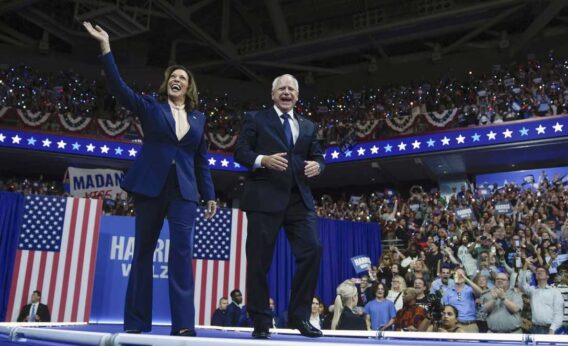
Vice President Kamala Harris’s entrance into the 2024 presidential race has transformed a limping electoral contest into a full-blooded dash to the finish line.
Perhaps what seems to be the most underappreciated is Harris’s expressed recognition of this unprecedented moment in the nation’s life—bloodthirsty, stultifying tyranny vs. forward-looking democratic freedoms.
Likewise, in the period leading to the election and its potentially tumultuous immediate aftermath, Harris is ably working to unify the Democratic Party’s diverse, multi-class coalition that is propelling her campaign while attempting to woo those considering whether to vote or to vote for Trump or Harris.
This diverse, ever-expanding, loosely knit anti-MAGA coalition includes movements and public figures able to influence constituencies that have tended to follow them.
In addition to battleground states critical to an Electoral College victory in the presidential race, the Harris campaign and the Democratic Party have been helping down-ballot races––particularly U.S. senatorial and congressional swing races––with financial and human resources to guarantee a post-election trifecta to defend democratic gains and advance new ones.
At our country’s present historical stage, the Harris campaign and the Democratic Party are within the ambit of our capitalist democracy, with all its inconsistencies. On the other side, Trump and the Republican Party are within the domain of fascism, the open terrorist dictatorship of the most reactionary sections of capitalism.
In the electoral sphere within the present historical stage, the Harris campaign is deftly situated––strategically and tactically––in the middle while tending to lean left, given the candidate’s overall record and disposition. While there is a justified call from many progressives for the Harris-Walz campaign to put words to action regarding the genocide happening in Gaza, the campaign overall reflects the multi-class, multi-racial, diverse working class, labor, and oppressed people’s core base it represents.
Given her record, if Harris won the presidential election and the Democrats won both houses of Congress, the Harris administration would be in a powerful position to pursue a progressive agenda. Were she to do so now during the campaign, it would be political suicide.

Here, I want to emphasize that Harris–like any other political figure–must be judged based on her overall record and political disposition, not on this or that individual problem or perceived problem, and definitely not without consideration of the concrete time, place, and circumstances in the world, nation, and sphere of influence of any particular individual.
Anything that gets in the way of taking the presidency and both houses of Congress is counterproductive and, given the neo-fascist disposition of Trump and his cronies, dangerous to democracy.
Additionally, according to the educated estimate of scientists, human life is on the November ballot, especially when considering the ever-escalating pace at which climate change is taking place. Also, nuclear weapons abolitionists are alarmed by the possibility of Trump and his close associates being the ones to have the finger on the nuclear weapons button.
To my surprise, I’ve recently encountered left-wing political activists who fail to see the historic nature of a Black woman––in this case, also a daughter of immigrant parents of color––becoming the president of the United States of America.
The hundreds of thousands, if not millions, who responded enthusiastically to Harris’s candidacy grasped, if loosely, the precedent-setting nature of her presidential run.
It took the deadliest, bloodiest revolutionary American Civil War, which broke the back of slavery in 1865, a short-lived Reconstruction period, and a century later, the Civil Rights movement led by Dr. Martin Luther King, Jr., to establish on firm ground the right to vote and to run for public office by Black Americans, women, People of Color generally, and other marginalized peoples.
And to complete that picture we must recognize the role of women, through many a personal and mass public struggle, in breaking the chains that bound them to a subservient role to men in our country going back to the Middle Ages in Europe.
Perhaps no two phrases symbolize the merging of these political currents better than “Ain’t I a Woman,” declared by former enslaved abolitionist and suffragette Sojourner Truth in 1851, and “I am a Man,” declared by unionized African American striking sanitation workers in 1968.
It is on the shoulders of these dual, often intersecting, currents that the candidacy for president of Kamala Harris emerges today.
As the contradictory nature of major junctures in a nation’s life would have it, ours is a moment that, on one hand, holds immense possibilities for democratic freedoms and, on the other, unprecedented dangers for an authoritative, repressive rule.










